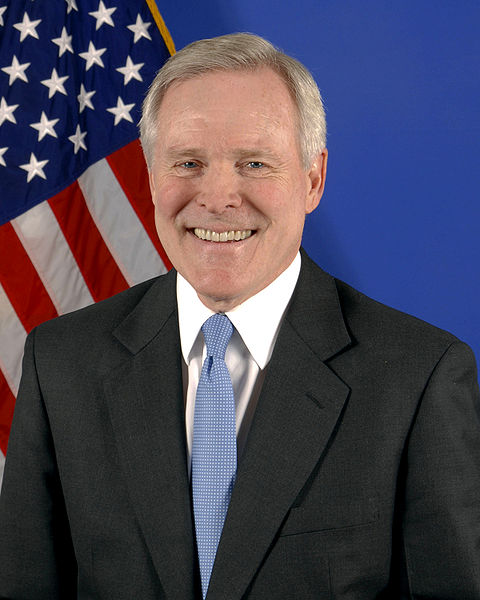 |
| SecNav Ray Mabus (Wiki Info - Image: Wiki Commons) |
By Claudette Roulo
American Forces Press Service
WASHINGTON, March 25, 2014 – More than 200 years ago, the architects of the Constitution recognized that the nation needed a naval force to operate continuously in war and peace, Navy Secretary Ray Mabus said today.
At that time, the United States had a crucial role in the world, he said at a hearing of the House Appropriations Committee’s defense subcommittee.
“Today, that role is exponentially larger,” Mabus noted. “Whether facing high-end combat, asymmetrical threats or humanitarian needs, America's maritime forces are ready and present on Day One of any crisis for any eventuality.”
In today's dynamic security environment, the forward presence of naval assets serves to reassure the nation’s partners, he said, “and remind potential adversaries that we are never far away.”
When an international crisis develops, this presence offers the president immediate and capable options, Mabus said. In just the past year, he added, naval forces have operated throughout the Pacific region, in Afghanistan and from the Gulf of Guinea to the Arctic Circle.
The 2012 Defense Strategic Guidance and the 2014 Quadrennial Defense Review are focused on maritime issues and require naval forces to be forward-deployed, the secretary said. People, platforms, power, and partnerships -- the key factors that enable the global presence and global action of naval forces -- have been Mabus’ focus as secretary, he added.
“In our fiscally constrained times, we have used these priorities to help balance between the readiness of the force, our capabilities, and our capacity,” Mabus said. “Our people are our biggest advantage, and we have to ensure that they continue to get the tools they need to do their jobs.”
One way the Navy is recognizing its people is by increasing sea pay for sailors and Marines deployed aboard ships, he said. But, Mabus noted, the growth in compensation and benefits threatens to affect all areas of the defense budget.
“If this is not addressed, as [Adm. Jonathan Greenert, the chief of naval operations] puts it, the quality of work for our sailors and Marines will almost certainly decline,” he said.
Shipbuilding and naval platforms remain key elements of the nation’s maritime power, Mabus said. “While we have the most advanced platforms in the world, quantity has a quality all its own,” he added.
Under the budget plan proposed by the Defense Department, the Navy is on course to return the fleet to 300 ships, the secretary said. The Navy continues to look for ways to spend smarter and more efficiently, Mabus said, an effort that has driven down costs through competition, multiyear buys and “driving harder bargains for taxpayer dollars.”
Ensuring that ships, vehicles and aircraft have adequate fuel is a national security issue, he said, noting that fuel price increases threaten to degrade operations and training and could affect the number of platforms the nation can afford.
“Having more varied, stably priced, American-produced sources of energy makes us better warfighters,” Mabus said. “From sail to coal to oil to nuclear, and now to alternative fuels, the Navy has led in energy innovation.”
Since the end of World War II, the security and stability provided by the forward presence of U.S. naval forces has helped maintain the foundation of the world economy, he said.
Today, partnerships with other nations continue to increase in importance, the secretary told committee members. By virtue of their forward presence, the Navy and Marine Corps are well-suited to develop these relationships, Mabus said, “particularly in the innovative, small-footprint ways that are required.”
With the fiscal year 2015 budget submission, the Navy is seeking to provide sailors and Marines with the equipment, training and other tools they need to carry out the missions that the nation needs and expects from them, he said.
“There are never any permanent homecomings for sailors and Marines,” the secretary said. “In peacetime, wartime and all the time, they remain forward deployed, providing presence and providing whatever's needed for our country. This has been true for 238 years, and it is our task to make sure it remains true now and in the future.”
